Suspected by the feds of running an investment scam on pro football and basketball players, Donald V. Watkins decided his best defense was a strong offense.
Credit: Johnny Edwards
Credit: Johnny Edwards
So with the U.S. Securities and Exchange Commission subpoenaing his records, he sued the agency and one of its assistant directors, asking a federal judge to put a stop to the investigation. Watkins, a former Alabama civil rights attorney with Atlanta connections, charged that the SEC was retaliating against him for his online criticism of Alabama Gov. Robert Bentley and others.
That argument fell flat with U.S. District Judge Steve Jones, who over the past week has not only thrown out Watkins' preemptive 2015 lawsuit, but also rejected Watkins' request for an injunction against the SEC in its now-pending fraud complaint against him. In a civil lawsuit filed in September, the feds alleged that from roughly 2009 to 2014, Watkins convinced several athletes to invest millions of dollars in his waste-to-fuel companies, but then put the money toward his own debts and expenses, including alimony payments and paying for a personal airplane.
Even if the SEC case was done for retaliation as Watkins claims, the judge said, being compelled to give a deposition and produce records isn't the kind of harassment or intimidation that could discourage the exercise of First Amendment rights.
"The allegations in the complaint," Jones said in his order denying an injunction, "are more than sufficient, at this stage, to demonstrate a possibility of recurring violations."
Jones also noted that Watkins is under investigation by Federal Deposit Insurance Corporation and he has sued that agency, too. So Watkins' claim that the SEC is costing him "business goodwill" can't be substantiated, the judge said, since his battles with the FDIC could just as easily cause that.
Outspoken and politically-connected, Watkins lived in Atlanta until at least 2014, according to the SEC. His attorney told The Atlanta Journal-Constitution in September that he lived in Midtown, but then Watkins denied being a Georgia resident in court documents filed later that month.
The SEC complaint says he told current and former pro athletes that his companies, Watkins Pencor and Masada Resource Group, would soon reap millions, if not billions, of dollars. Watkins falsely claimed that multinational trash company Waste Management Inc. was preparing to buy him out, then later claimed a Saudi Arabian prince was interested, the complaint says.
An NFL player handed him $1 million. Another football player gave him $500,000. A former NBA player gave him $2 million.
Credit: Lois Norder
Credit: Lois Norder
Watkins has denied violating any laws or misleading anyone, saying in court documents that a deal with Waste Management was indeed in the works.
The SEC won't name the athlete investors. But, based on other pending litigation, one of them apparently is Bryan Thomas, a former New York Jets linebacker who played college ball at the University of Alabama-Birmingham. In his own complaint, Thomas said Watkins told him that former Secretary of State Condoleeza Rice was joining Masada as an adviser, and that Martin Luther King III had requested a meeting with President Barack Obama at Camp David to talk about Masada.
Apparently describing Thomas, a section of the SEC complaint says that after an "NFL investor" handed over $1 million, about $500,000 went to refund one of Watkins' law clients; more than $166,000 went toward Watkins' debts from his partial ownership of Alamerica Bank; more than $41,000 went toward an American Express bill; $25,000 went to Watkins' then-girlfriend; nearly $21,000 went toward a personal plane; and $14,500 went to his ex-wife.
In his filed response to the lawsuit, Watkins characterized the athletes as "economic participants," not investors. He defended his companies and business dealings, citing arrangements with prominent former Georgia and Texas politicians. Watkins said Masada has a market reach in 47 countries and offered documentation of his dealings with a Saudi prince.
Watkins also says that when he explored purchasing a stake in the St. Louis Rams in 2009, a financial advisory firm valued Masada and its related companies at between $2.9 billion and $3.6 billion.
Credit: Johnny Edwards
Credit: Johnny Edwards
Watkins was also in the news last year for a different reason, when then-president elect Donald Trump nominated Alabama U.S. Sen. Jeff Sessions to serve as his attorney general. Watkins, in a Facebook post, vouched for the character of his former law school classmate, recounting how Sessions once invited him to join the Young Republicans – an offer he declined.
"Jeff was a conservative then, as he is now, but he was NOT a racist," Watkins wrote, a quote picked up by several news outlets.
Watkins said he should have stood up for Sessions when he was nominated for a federal judgeship in 1986 and several Democrats derailed him.
"I should have volunteered to stand by his side and tell the story of his true character at his confirmation hearing," Watkins wrote on Facebook. "The fact that I did not rise on my own to defend Jeff’s good name and character haunted me for years. I promised Jeff that I would never stand idly by and watch another good and decent person endure a similar character assassination if it was within my power to stop it."









